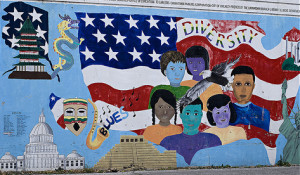
In a recent email exchange, an acquaintance wrote, “I’ve got nothing but love for my culture and my people.” As someone who writes about ethnic and national identity, this statement immediately piqued my interest.
When spoken by a person of color, as it was in this case, this sentiment comes across as an uncomplicated and straightforward expression of ethnic and cultural pride. America has seen progress recently, but negative depictions of people of color have permeated U.S. history. As a result, some Americans from groups that have faced discrimination push back against these negative depictions by expressing strong feelings of pride and solidarity. As a white, Jewish American, I considered how I express my relationship to my own culture, ethnicity, and national identity.
I benefit in countless ways from being seen as white, no matter my self-identification or feelings of affinity with white people as a group. My whiteness is complicated by the fact that I’m Jewish, which means many racist white nationalists don’t see me as white. And my Jewishness is qualified by my nonconformity to Hasidic tradition, which would clearly mark me as such were I to follow it.
I identify with Jewish history in a personal way, but would I say Jews are “my people,” and that I love their/our/my Jewish culture? I certainly feel more connection to the American Jewish community than I do to whites in general because of our shared history and cultural similarities. When I think of American Jews, and even Jews worldwide, I think in terms of “us.”
Ultimately, being an American is my primary group identity. I strongly identify as a part of this group whose shared, multifaceted history is defined by cultural, religious, ethnic, sexual, and ideological diversity and a commitment to democratic principles. I can’t say I love American culture in its entirety, but I believe Americans have an obligation to one another to contribute to a common good. I believe in a culture that demands respect for our differences of opinion and desire for freedom. This isn’t love in the way I love my family and closest friends, but it is a meaningful feeling of community and national pride.
Loving my fellow Americans doesn’t mean I feel negatively toward people from other countries, and it doesn’t mean I think America is perfect. I’m fully aware of this country’s strengths and its flaws, of the tremendously positive and the terribly harmful treatment America has shown to Americans and foreigners alike. Taken as a whole, I identify with American history much like Michael Lind: “Even if our genetic grandparents came from Finland or Indonesia, as Americans, we are all descendants of George Washington—and his slaves.”
Feeling connected to my country and to all its citizens is consistent with my progressive beliefs, in particular because Americanness can be — even though it hasn’t always been — an inclusive form of national identity. Americanness can offer a model whereby people of every imaginable background see themselves as part of a single community, a model that stands in powerful contrast to fundamentalism and hate. That’s the kind of identity that builds bridges rather than walls. And that’s the kind of America I can wholeheartedly love.
Ian Reifowitz Ian Reifowitz is the author of Obama’s America: A Transformative Vision of Our National Identity. Twitter: @IanReifowitz
- Follow us on Twitter: @inthefray
- Comment on stories or like us on Facebook
- Subscribe to our free email newsletter
- Send us your writing, photography, or artwork
- Republish our Creative Commons-licensed content

